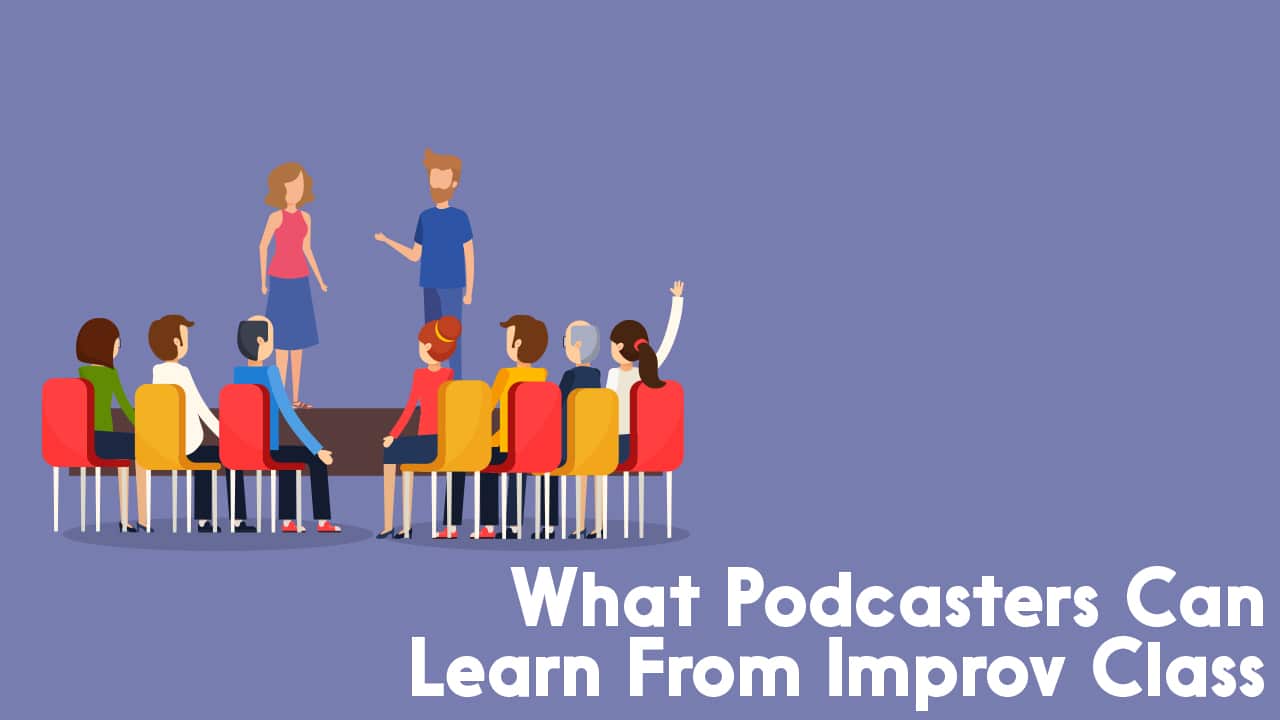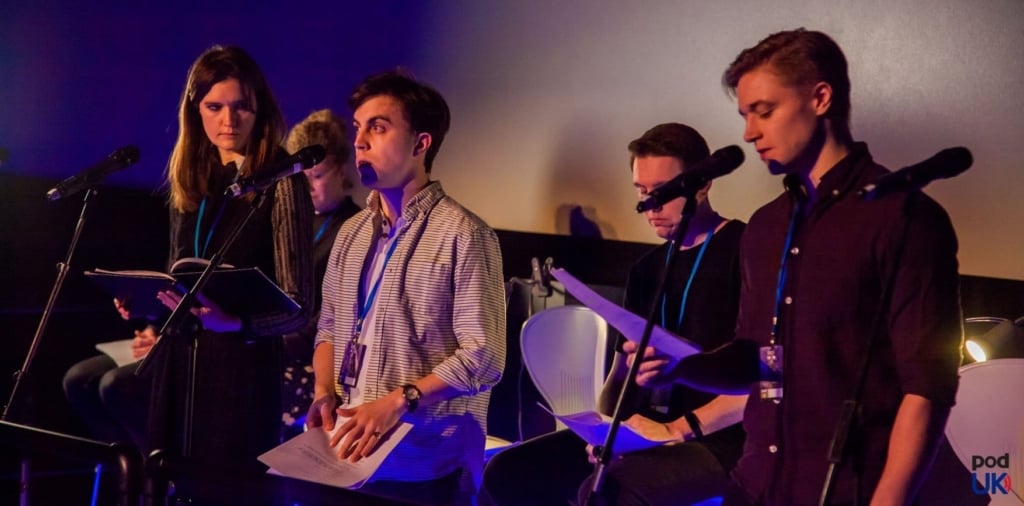What Podcasters Can Learn From Improv Class

All podcasters should take improv classes. There, I said it.
You may think this is an unpopular opinion, but I will show you that this is a true, scientific fact. True, you might scoff, saying, “my classy interview show with influencers and intellectual giants is too serious for game-show tactics.” Perhaps you muse, “I don’t have time to play games, I’m busy researching the smoothest, smartest passive income strategy for entrepreneurs.” Improvisation class often gets a reputation for being frivolous.
That’s fine. You can be busy and intellectual all you like. There are skills you will need to make a podcast that hooks listeners, keeps their attention, makes them want to hear more, and recommend your podcast to their friends. All of them are skills you will learn in a good improvisation class.
I spoke with Matt Elwell, the Executive Director of CSz Worldwide, which offers shows, classes and corporate events. Their shows and classes are always fun. He said, “CSz Worldwide has been delivering training in these kinds of essential life skills like communication, creativity, and collaboration since our founding in 1984. With 30 companies spread out across the United States and one in the UK, our classes are convenient as well as valuable!” Later in this article, Jason Geis of ComedySportz Chicago will give you some podcast-specific details. But first, let’s get to your skills.
Speaking
The best improvisers have to be very careful to communicate clearly with each other. If you have a fear of public speaking, or difficulty expressing yourself verbally, an improvisation class can help.
For example, if I’m tired, I have a lisp that comes out and makes it hard to speak clearly. Improvisation classes not only help me build the motor skills to better enunciate, they give me strategies and exercises (such as tongue twisters) to wake up my mouth muscles and keep me from falling into bad speaking habits.
Listening
No matter what kind of podcast you create, being a good listener is essential to any audio project. If your podcast has a lot of interviews, being a good listener helps you know what questions to ask. If your podcast depends on field recording, you’ll learn to how listen more carefully for extraneous sounds you might need to eliminate in the editing stage. An improvisation class will help you pay close attention to what’s happening immediately around you, so that you can build on it.
What’s on your platform?
In some improvisation exercises, participants use what’s called a platform to start a scene. The platform includes
- who’s in the scene,
- where are they,
- what activity are they trying to accomplish.
Conflict and interestingness comes later. The platform is simply a setup. So, if you have a husband and wife, in an art museum, trying to build a boat, that’s your platform. You only work with what’s in that imaginary situation.
How does this apply to podcasting? Sometimes you will be in a situation where things don’t go according to plan, and/or your resources are limited. Thinking about your platform- who’s involved, where you are what you have, and what you’re trying to do- objectively, helps you solve problems. In the case of our imaginary couple, they could take down the paintings, use the frames for ribs, the canvas for skin, and build a canoe. In the case of your podcast, you look at the available resources. Your interview guest shows up on time to record, but the neighbors are having their dog’s birthday party outside next door? Use dogs as a discussion point in your interview. Poor sound quality makes it sound like you’re in a cave? Tell your listeners that Bruce Wayne is generously letting you use his basement.
Accept and Build
If someone comes up to me with a plate full of anchovies, and says, “Here’s lunch,” I have two choices. I can say, “ew, no thanks,” and go hungry. Or, I can say, “Yes, and let’s get some pizza to go with them!” I don’t like anchovies at all, but if that’s what’s on offer, I can starve and be miserable, or I can accept their offer and build on it. This “yes and” mentality can help you with any kind of project management.
Trying to record, but someone’s running a chainsaw outside? Accept and build. This person could be your next podcast guest. Heard a great piece of music that you want to use for a theme song, but it’s copyrighted? Accept and build. Chat with some musicians about what you like about that piece of music, through a service like fiverr.com. Then, have them create a wholly original and catchy tune for your podcast. The accept and build strategy will help you make discoveries and embrace the unexpected.
Commitment and Failure
Sometimes you start planning your next episode, and you get stuck. You get mired into thinking about details (should I use Audacity or Reaper? Should I use a transcription service, or transcribe it myself?) and end up not making progress. The constant forward motion of improvisation games means that you have to take what’s offered and build on to it, whether it works or not. As a result, you become fearless very quickly.
Consider, if you will, the 185 Game. The concept of this game is that someone gives you a noun, and you plug it into the following statement, making a pun.
“185 (nouns) walk into a bar. The bartender says, “hey, we don’t serve (nouns) here. And the (nouns) say, (some pun based on whatever the noun is).”
So, let’s say the noun is “lion.” You step up and say, “185 lions walk into a bar. The bartender says ‘hey, we don’t serve lions here.’ And the lions say, “Fine, we’re leaving, you won’t spoil our pride.” Or, “What kind of watering hole is this?” Or, “That’s okay, the bars are better on Mane Street.” The point is, you listen to the offer (lions), accept and build (what are some words associated with lions? Pride, savanna, fur, claw, roar, watering hole, mane…), speak clearly, step out and say, “And the lions say, ‘That’s rather discriminatory, we’ll take our business elsewhere!”
Even if the pun isn’t very good, your commitment, clarity and confidence can make up for a failed pun. And if you do step out and mumble something like, “and the lions said, ‘this place doesn’t sav-anna-thing good, anyway…” before slinking back into the shadows, it’s no biggie. You’ll do better next time.
The point is, you can practice committing, and failing, and taking criticism. Pick yourself up, dust yourself off, start all over again. After taking an improvisation class, talking into a microphone doesn’t seem so scary, does it?

Real-World Experience
Jason Geis, the artistic director of ComedySportz Chicago, is a former podcaster. He said that podcasters can learn, “A ton. First, people can learn give and take. So much of the mike work when you have multiple hosts is not talking over each other, and knowing when to go (makes it easier for cleanup as well).
Second, you learn how to be loose, period, and not overplan what you are going to say. When we first started my other co-hosts had scripts, and it did not work. You can use improv to do beat sheets for your podcast, and have that be your guide. Depending on the type of podcast you are doing, improv can help with character development and even coming up with segments.”
Jason said that other benefits include, “a multitude of things outside of performance. I, myself, use it to train people I work with in advertising. We use it for presentation skills, for speedy responses, for phone presentations, for brainstorming…everything really. There are so many skills that improv can help you get better at.” He told us about some great shows that merge Chicago’s podcast and improvisation communities, such as Hello From the Magic Tavern , Poppin’ Bottles and Shared History.
Another way to polish your skills, gain confidence, and learn about the latest tools is to take the Podcast Host Academy Voice Training for Podcasters course. It’ll arm you with the tips, advice, encouragement, and skills necessary to create a great show.
